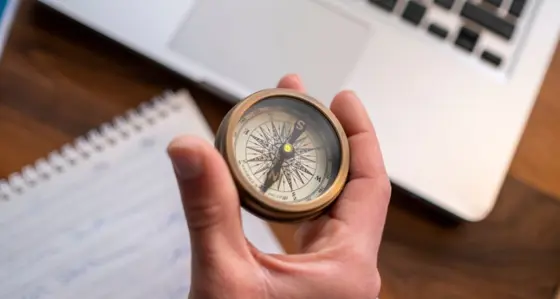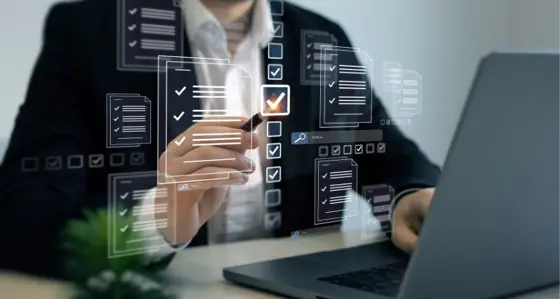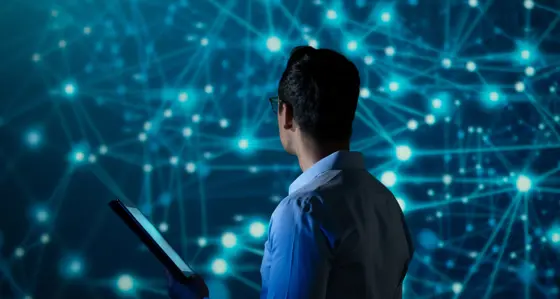Mansi Welcome to a new episode of The Rise of the COO, the podcast from Baringa's COO Network, where we tackle the topics that matter most to Chief Operating Officers today. I'm Mansi Patel, Capabilities Sector Leader and COO network sponsor at Baringo. In today's episode, we're talking about resilience, what it takes to find balance and an inner edge in one of the toughest jobs in business. I'm delighted to be joined by Katie Worgan, Group COO at L&G. Katie will share her perspective on leading with clarity in high pressure environments, the importance of discipline and boundaries, and how to surround yourself with the right team to succeed. Katie, it's such a pleasure to have you with us. Thank you for joining.
Katie Thank you for having me, Mansi.
Mansi Katie, let's kick this off with a question about your new role at L&G. I know you've recently stepped into that. Tell us both a little bit about L&G and how that transition has been for you.
Katie So I've been at L&G for just over six months now, and I came in as their group chief operating officer. And that's a new role. LN& has been around for 189 years and hasn't had a group chief operating officer to this point. So that's interesting for me, having always worked in firms where there was one. And I'll go on to explain a little bit about that evolution. But L&G itself, for the audience that may be less familiar with it, it's one of the largest financial services firms in the UK, founded in 1836 and comprises three synergistic businesses. So we've got asset management, which is a major global investor across both the public and private sectors with over 1.1 trillion pounds in assets under management. The clients within asset management are individual savers, their pension scheme members, as well as global institutions who invest alongside L&G's own balance sheet. We've then got an institutional retirement business that works with companies, defines benefit pension schemes, and their advisors to help them protect and secure their scheme members' retirement benefits. And then we have our retail business, which is a leading UK provider of retirement and protection services, helping customers today and tomorrow have better long term financial outcomes. So that's a bit about L&G. And that the group chief operating officer role was created when the new group chief executive joined. He's been in the business about 20 months and came in and immediately saw the need to have a group chief operating officer. So my remit spans technology, data, procurement, enterprise change, operational resilience, and customer outcomes. So many of the areas that kind of generally chief operating officers have accountability for.
Mansi Katie, you described that didn't exist in L&G previously. What's it been like to be part of an organization where you know how to do that role, but it's never existed in the organization? Just bring that to life a little before we perhaps go on and touch on the rest of our topic today.
Katie Yeah, so each of those businesses that I referenced have a chief operating officer, but there wasn't the role that spans across the enterprise. So you didn't have the role that is looking left to right across the organization and and top to bottom. So one of the reasons for creating the role is really about that opportunity to join up the organization. But one of the things that I've had to spend considerable amount of time doing is actually setting out and explaining why the group chief operating office exists and that value that we will bring to the businesses.
Mansi Great. Now we'll come back to you at L&G , in a moment and your role there, but it'd be good just to hear, given the time period you've been there, a little bit more about your career journey to here and what's shaped you as a leader?
Katie So I think I'm coming up to 30 years in financial services. And prior to this role, worked in banking. So I had 26 years with one bank doing a variety of roles, but always in the kind of retail banking, wealth management, private banking space, and worked internationally with that business. So I worked across the US, Middle East, and Europe. And then I moved to another bank, a UK based bank, where I was a divisional COO. And my last role at the prior firm was also a divisional COO. So always financial services, but probably spent about half of my career outside of the UK as well.
Mansi Some great global experience which makes such a difference to rounding out how you look at businesses, doesn't it? And what do you describe as I guess having shaped you most as a leader?
Katie I'd say it's probably that cultural exposure that I've had and working in, you know, different countries, different markets. And even though within that international career I was working for the same firm, there were certainly in how things were done, regulations, cultural nuances. And I think that's probably what shaped me. And when we come on to kind of talk about resilience, I think there is something in the career that I've had which has really helped and supported me in terms of being resilient because every two or three years I was somewhere new, having to, you know, establish a new life and assert myself into a role. So yeah, there's probably something in that which is very closely connected to resilience.
Mansi Well, there's such a wonderful both breadth and depth in your experience over those thirty years, whether that is across the full enterprise, from a different geography, seeing that business that you're in from top to bottom as you described. Now you've taken us to the topic of resilience, which is a core theme for our discussion today. And being a COO, particularly in today's world, takes so much more than just strategy in the execution of this strategy. It does take resilience. What does resilience mean to you personally?
Katie So I think that's a really important question because I think it's one of those words that often gets overused or can mean different things to different people. So if we just sort of ground it in my understanding of resilience, so I think about it as that kind of inner capacity that we have to absorb challenges, stop and evolve and adapt to things that are happening around us. People will often sort of use the phrase bouncing back in connection with resilience. I'd say for me it's more about bouncing forward. So it's not only how you manage and respond to a situation which requires you to be resilient. But for me, it's about how I kind of learn and evolve and grow from that experience. And the thing that always comes in my mind when we talk about resilience is bamboo. So when I think about bamboo, you can picture it kind of blowing in the wind and it still maintains its strengths, but it's flexible. But it sort of doesn't matter how hard the storm is, the bamboo doesn't break. It goes back to where it needs to be, but it also grows taller and stronger as a result of that experience that it's had. So that's kind of how I think about resilience.
Mansi I will remember bamboo for a long time. to come. Thank you for the analogy. Is there perhaps an example that you might share with us to bring that to life for this audience that is listening today?
Katie Yeah, so there's look, you kind of touched on it at the top of the call. And I think, you know, I would say this, wouldn't I? But you know, I do think the nature of chief operating officer roles lend themselves to often having personal resilience tested. You know, you could probably say that about any leadership role at any level. I think there is a need for individuals to be resilient. But the situation that always comes to mind when I think about where I was most tested was some time ago, actually, probably halfway through my career. I was working in Europe, and the business that I was part of experienced a significant data theft some years previously. But whilst I was there, and I'd only very, very recently moved into a role, the news broke that there had been a data theft, and the bank had to quickly respond. And I was working for the regional CEO at the time, and I remember he called me on a Friday night and asked me to write a response paper which we could send to the regulator to demonstrate to them how we were going to manage this and mitigate this, which I did. And by the Monday morning, I sort of found myself leading the bank's response to this data theft, which I had no training for, there was no playbook for it, you know, it was it was one of those where you seem to kind of you've got something in your head which has landed well with the regulator and go and make it happen. And that was an intense period of time. It probably lasted a good six months in total, the bit where it was what I would describe as intense, but there was probably a period of a month where it was hard and there was frankly an existential threat to the bank because of this. And I didn't get it perfect by any stretch, but I learned so much in that period. Things like the importance of being really clear on what we were trying to achieve, having everyone aligned to that objective, ensuring that we got the right people supporting and leading various work streams that we needed, keeping communication really open and honest. And I think probably most importantly for me was having a and it was actually a couple of people, but having people who were not involved who I could just share what was on my mind and had that kind of outlet because there was a lot of adrenaline at that time and, you know, a lot of a lot of long hours. But it was really important that I had a mechanism to decompress, really.
Mansi I mean those situations are A, so stressful, but B require from the individual the utmost calm in that moment. And to show up like that must also then just take a toll differently. And I wonder if I might invite you to share how you handle these situations without letting them spill into the rest of your life.
Katie Yeah, I think look, I probably didn't know this at that time, but the bit that I have appreciated over the years is, you know, I'm not doing open heart surgery. I can't really kill somebody in the role that I have. And that of itself just gives me an element of perspective. And I also know that when I'm doing my work, I'm trying to do the best job that I can. And I know that I am very values-led as a leader. And so I'm always working with positive intent. So even if I don't get it right, or even if I make a mistake or I'm clumsy with something, I know I'm not going to kill somebody. And I also know that I'm working with positive intent. And that for me is a very positive framing to have in my mind. But I touched on, you know, there were a couple of people in that situation who were one of them was a friend completely outside of the business. And another one was a person that did work at the bank, but was sufficiently removed and that they were not in the thick of it. And I could reach out to that person and kind of just share how I was feeling or get a perspective on things from somebody that wasn't in the kind of heat of the moment. So for me, it's probably those two factors. One is being able to contextualize rationally, not always immediately and not always perfectly, but be able to put that context around what we're doing and then ensuring that I've got a safe space where I can, yeah, where I can share and get that outlet.
Mansi I think it's so important to hold on to what you described there, that perspective, even if as you described it, it doesn't come immediately. But knowing that and the positive intent together, work in a way that gets you there, I think is crucial. Now, Katie, obviously you don't work in any form of a silo. You have a leadership team around you. It would be good to hear a little bit about how you build a leadership team that supports your resilience as much as I imagine you support theirs.
Katie So when I think about the people that surround me, you know, it's obvious, right? But I don't want people that are mirror images of myself. Like that would be dangerous. So I'm always thinking about the complementary skills that people have. Attitude, to be honest, is probably more important to me than skills, because I do think skills can be learned to a large point. But I sort of think about the compliment that people bring to the broader team. And then from a resilience perspective, the bit that I want to ensure, and it's something that I think you have to continue to create, is that environment of psychological safety where people feel really comfortable to share what's on their mind as much as they want to, because again, we're all beautifully different, right? And some people, you know, some people don't want to talk about what's going on in their personal lives or want to be completely professional in inverted commas at work. And that's absolutely fine. But ensuring that people feel and for me as a leader with my team that I feel that I can be open and I recognize that as a leader you have a leadership responsibility right. So if I came into work every day, you know, oh my gosh, this has happened or I'm not really happy with this or this part of the strategy doesn't make sense, you know, that I perhaps don't share everything that runs through my head, but I do want to have an environment of trust and where people can come to work and be themselves and share what's on their mind. So that's probably the thing that I focus on most is creating and sustaining that psychological safety.
Mansi Such a key thing to get right in great teams that perform really well. It really resonates with me. And as you share that, I'm struck by just your tone and your thought that goes into the tone in terms of how you think about your team, how you lead them. And I'd love to know just a little bit about energy. I guess it takes a huge amount of energy to sustain yourself in the environment that you work in, to create that psychologically safe place to work for your team and to think about what's the right tone today, what's the energy I put into this situation? I'd love to hear a little bit about how you sustain your energy over the long term.
Katie I think my style is to be, number one is to be myself, right? But as I said before, I do recognize that, you know, if I if I sort of shared everything that went through my head in live, that probably wouldn't be particularly helpful all of the time. So for me, the way that I think about that part is I think my role is to bring context and clarity to the team so that they really understand where we are, where we're going, and really importantly why we're doing what we're doing, and give them as much clarity as I possibly can about their individual role in helping us get where we need to get to. And I think more about how I do that, because for me that links back to psychological safety and creating kind of a consistent and safe environment rather than necessarily thinking about the energy. But I would say if you were to speak to my team, they would say that they know where they stand with me. You know, if I'm happy, I'm really happy. If I'm a bit frustrated about something, they will know, but know in a way that is constructive and can help us go forward as a team.
Mansi Katie, it sounds like you've got a great team around you, one that you've built and you've created the right conditions for success on. We all know that team is both at work, but each of us has a team in life as well. And I guess it would be great to hear a little bit about outside of work, what does your support at home look like? How do you lean on either family or friends without overloading them, just given the high pressured breadth of work that you do in the day to day?
Katie Yeah. So let me start with friends first. So I've got five girls that I was at school with. And we have all got kind of different career directions. One's a head teacher, one's a digital marketer. I'm going to forget everybody's jobs. But we've all very different paths. But we're united in that, you know, from whatever it was, 13 to 18, we were kind of we were at school together. And I don't see them very often. When we're together, we don't really talk about the jobs that we do, but they are again, they're that space, whether it's on WhatsApp or you know, when we do meet up, that I'm not quite 18 again, but you know, we've just got that knowledge of each other, which has got nothing to do with a professional life. And that's just another great outlet for me. And then at home, I've got my husband and two children. So I have a daughter who's 13, a son who's eight. My husband spent his career in the army, and then when our daughter was born, he was able to retire from the army because he'd served 24 years and has been the stay-at-home dad ever since. So we have, I think, a more common but still relatively unusual setup at home where he pretty much does everything in the home. And I'm away from home sort of three or four days a week. So yeah, he takes care of everything and the children, and it's brilliant. And that's the setup that really works for us. And he again, we don't spend hours and hours, you know, talking about what I do. And I think for different reasons, and I think in part because I'm away from home for quite a large amount of time, when we are together, I try not to talk about work. I don't really want to talk about work when we're together, but he's a brilliant listener. And so those moments where, you know, something's happened and I just have to get it off my chest, or there's something which I just can't quite get clear. I mean, I'm sure he's zoning out half the time, but he's looking at me and he's nodding, and often he will say things to me, and I'm like, oh my gosh, that's that's the answer. Like, how do you know that? I think he knows it because he knows me really well. And you know, again, a lot of the things that I need to deal with and manage in work are very people related and he's got tons of experience in that area. So yeah, it works well with us. So a very small, tight friendship group and then a brilliant partner.
Mansi What a wonderful setup, both in terms of friendship and family that sits around you, Katie. If you were to pick perhaps one thing that you've learnt as a lesson, either from friends or family, that's made you a strongest COO, what would it be?
Katie Ooh that question that's got me thinking, I don't know if it's about making me a stronger COO, but the bit that I pride myself on is that I'm pretty much the same out of work as I am in work. And you know, I sometimes make a joke that the only difference about me at home is that I'm in pajamas and I probably wouldn't do that at work. But everything else, kind of what you see is what you get. And I think not putting that pressure on myself to be somebody different at work. So I don't know if it's something that they've helped me with, but I think the fact that I am just myself with my friends and my family and continue to be like that person at work, again that works for me.
Mansi Well I can say I certainly confirm that over the last 18 months as we've gotten to know each other, you have certainly shown up as your authentic self in each and every interaction that we've had. And I can confirm to the listening audience that you're not doing this podcast in your pajamas. So that's certainly true. Katie, time goes really quickly in these podcasts. Perhaps before we close out today, I'd love to just ask you, going back to that topic on resilience, is there any advice you would give to a first time COO?
Katie Well, it's always hard giving advice, isn't it? Because, you know, we are all different. And I don't think there's a single recipe for success. As I said before, I think that the two things that have worked for me are ensuring that you have got a team around you in the broadest sense. So, you know, your team, your manager, your partner, your family, your friends who that environment works and is supportive. And then the other thing, which as I said, probably did take me some sticky moments to appreciate and putting things into perspective and recognizing that, you know, things can go really wrong in business. And as the chief operating officer, we are often at the kind of center point of the things that go wrong. And just being able to put that into perspective and remembering that we are part of the solution has certainly helped me. Great.
Mansi Thank you for that, Katie, and thank you so much for joining us today as well. It's been a pleasure having you with us. Thank you so much for having me. I've really enjoyed it. I've really enjoyed discussing this topic of resilience with you today. As you said throughout this podcast, it's often a word that's used a lot, but I think to really get under the hood of it as you've described it today is where the value is, where people really hear it from someone at the top describing what resilience means to them and also how they deal with it, with the degree of honesty and transparency that you shared. So I'd just really like to share a massive thank you on my behalf because I know lots of our listeners will find that really encouraging and will really recognize that there is such a great human behind every big title as well. And to our listeners, thanks for tuning in. If you enjoyed this episode, do check out others in the series and let us know what topics you'd like us to cover next. We'll see you next time on The Rise of the COO.






